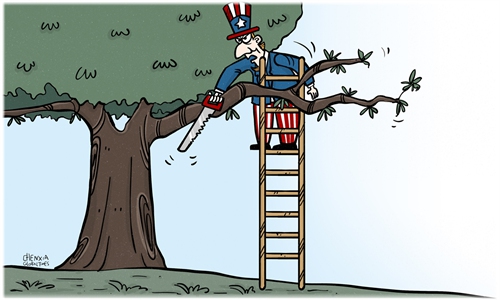
Photo: VCG
Editor's Note:
In today's world, where the futures of all countries are closely linked, development, security and civilization play important roles in promoting the modernization process of human society. The Global Development Initiative (GDI), Global Security Initiative (GSI) and Global Civilization Initiative (GCI), proposed by Chinese President Xi Jinping, offer profound insights into the issues of our time. The Global Times invites scholars to provide readers both at home and abroad with an in-depth understanding of these three initiatives. This is the sixth article in the series.
The concept of building a community with a shared future for mankind is central to China's ideal. Chinese President Xi Jinping proposed this idea in March 2013. China hopes the "community" will become a vital force in maintaining national sovereignty, ensuring security, sharing development benefits, and upholding fairness and justice in the international community, providing a guide for extensive consultation, joint contribution and shared benefits for humanity's future.
In April, 2022, President Xi delivered a keynote speech titled "Rising to Challenges and Building a Bright Future Through Cooperation" via video at the Boao Forum for Asia Annual Conference, where he first proposed the Global Security Initiative (GSI). In February 2023, China released a concept paper for the GSI, outlining its purpose of calling on countries to adapt to the profoundly changing international landscape in the spirit of solidarity and address the complex and intertwined security challenges with a win-win mindset. The initiative aims to eliminate the root causes of international conflicts, improve global security governance, encourage joint international efforts to bring more stability and certainty to a volatile and changing era, and promote durable peace and development in the world. The concept document also proposed six core concepts and principles, 20 priorities of cooperation, and five cooperation platforms and mechanisms.
Significant meaning
I believe the GSI embodies at least seven aspects of meaning.
First, it reveals a sense of mission in China's diplomacy. China's diplomacy is taking a comprehensive approach to address the tumultuous period of international order from a macro-historical perspective. This shift reflects China's proactive stance and its willingness to actively provide public goods for the international community.
Second, the GSI addresses both traditional security issues and security issues related to people's livelihoods. It encompasses non-traditional security challenges such as pandemic prevention, climate change, food security, energy security, maritime safety, counter-terrorism and cybersecurity - issues that are essential to daily life.
Third, China's security perspective is continually evolving beyond different regions. It not only seeks to resolve national security issues at the state level but also explores solutions at the international level. In 2014, President Xi clearly articulated a New Asian Security Concept For New Progress in Security Cooperation based on "common, comprehensive, cooperative and sustainable" strategy. This new security concept emphasizes regional security and collaboration among Asian countries to promote a consensus-based approach to security. Now, the GSI systematically outlines China's position on promoting shared security and maintaining global peace, emphasizing that humanity is an indivisible security community.
Fourth, it includes policy measures to safeguard both traditional and non-traditional security areas. The GSI outlines strategies for preventing security risks through a multi-faceted and integrated approach, improving rules, seeking long-term solutions collaboratively, advancing global security governance, addressing security deficits, and focusing on regional and issue-based cooperation to promote sustainable security.
Fifth, the GSI is a comprehensive representation of China's existing security perspective, integrating its foreign policy to date. National security is determined by a country's strength, worldview, and both domestic and international circumstances. The concepts of peaceful coexistence, responsible major countries, a harmonious world and a community with a shared future for mankind have all taken national security into consideration.
Sixth, the GSI synthesizes many of China's diplomatic ideas and propositions. It enhances the competitiveness of Chinese diplomacy and improves the systematic and comprehensive nature of its theories. Notably, it emphasizes an open and inclusive approach, welcoming and anticipating participation from all parties to enrich the initiative's content and actively explore new forms and fields of cooperation.
Seventh, it aims to provide global public goods for security, contributing Chinese wisdom and solutions. The GSI seeks to offer strategies for addressing the challenges faced by the international community during turbulent times while serving as a significant supplement to global security governance mechanisms.
China's role
Despite the unprecedented changes currently unfolding in the world, marked by the prolonged Russia-Ukraine conflict and the ongoing escalation of the Palestine-Israel situation, there is clearly room for China to play a significant role.
First, while China has initiated this GSI, maintaining and genuinely implementing it requires active participation from other countries. China is working to create a consensus and strives to actively engage with other nations in promoting the building of a community with a shared future for mankind.
Second, China is progressively working toward building a community with a shared future for mankind. This involves the organic formation of a community with a shared future with different continents and sub-regions. For example, the creation of the Asia-Pacific community with a shared future, along with other bilateral communities, should demonstrate interactive coordination in areas like development, security and civilization. It is crucial to establish a sustainable roadmap to facilitate the implementation of the GSI, especially in sensitive security sectors.
Third, it is essential to stabilize China-US relations. Some in the West have been promoting a "new cold war," and whether this atmosphere spreads largely depends on the state of China-US relations. The China-US relationship has become quite complex; while it is challenging to return to previous dynamics, it is necessary to create an environment in which the US can recognize, to some extent, that China's significance has increased and that the level of competition should be acceptable to the international community.
Fourth, we need to shape a new type of international relations. The Global South is part of the trend toward multipolarity.
Fifth, we must focus on balancing righteousness and national interests. Diplomacy should not solely pursue righteousness; it must also balance national interests. How the GSI addresses the resolution of complex issues involving major interests, such as the Ukraine crisis and the Palestine-Israel conflict, is a matter of considerable attention.
Illuminate the path
Following the 70th Anniversary of the Five Principles of Peaceful Coexistence held at the end of June this year, I had the privilege of attending the 2024 Conference of Global Public Security Cooperation Forum and the 11th Beijing Xiangshan Forum in September.
As a significant platform for public diplomacy, this year's Beijing Xiangshan Forum chose the theme "Promoting Peace for a Shared Future," powerfully demonstrating China's commitment to win-win cooperation. From my personal experience, the forum was a multifaceted success, amplifying the voices of developing countries while also ensuring the dissemination of China's perspectives.
During the group discussions at the Beijing Xiangshan Forum, one of the topics I participated in was "The Right Way for China and the US to Get Along," which was thought-provoking. Asia needs revival. A prerequisite for achieving this goal is effectively addressing security issues in Asia. I hope the GSI can illuminate the path to Asia's revival.
The author is the director of Institute for Global Strategy and Cooperation and professor at Hankuk University of Foreign Studies. opinion@globaltimes.com.cn



